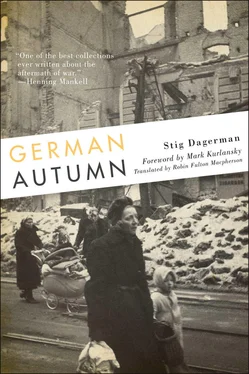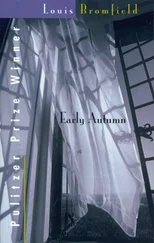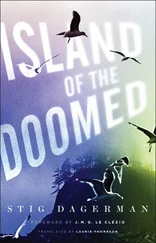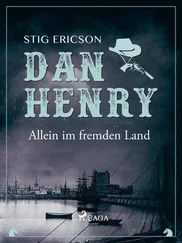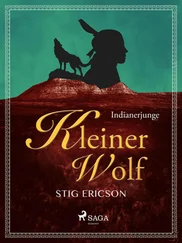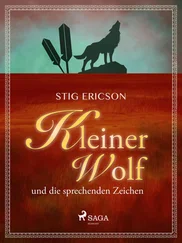As the plane rises towards the winter evening in a cloud of German rain and German snow, as the surviving German eagle on the airport vanishes in the gloom beneath us, while the lights of Frankfurt are extinguished in the smothering dark and the Swedish plane climbs above German suffering at a speed of 300 kilometres an hour, there is perhaps one question more than any other weighing on the traveller: What would it be like to have to stay behind, to have to be hungry every day, to have to sleep in a cellar, to fight at every moment against the temptation to steal, to have to tremble with cold every minute, to have to survive, constantly, the most intractable conditions? I remember people I met who had to tolerate almost all of that. And I remember above all certain poets and artists — they were not hungrier or suffering more than others, but I remember them because they were aware of the possibilities of suffering, they had tried to measure the distance between art and suffering.
One day in the Ruhr when it has been raining endlessly and when the bakers have not had bread for two days I meet a young German author, one of those who came out during the war but on account of certain spiritual reserves cannot be said personally to have ‘lost a war’. He has been allowed to borrow a fine Swiss-style villa in the middle of a forest and several kilometres of flaming red trees separate him from the most brutal privations of the brutally deprived Ruhr. It is strange to come from the lower depths of a Ruhr mine where a despairing miner with bloodshot eyes in a black face pulled off his battered shoes to let me see he had no socks — to come from there right into this autumnal idyll where hunger and cold were themselves cultivated to the point where they acquired almost ritualistic dimensions. It is a strange experience even to walk in an unspoiled garden, and in this bookless Germany, where a book is such a rarity that one approaches it with reverence simply because it is a book, to step into a room overflowing with books, from Dante’s Inferno to Strindberg’s.
On this island in a terrible sea sits a young author with the tired smile and the aristocratic name, smoking cigarettes for which he has traded away books, drinking tea whose taste is as bitter as the autumn outside. His way of life is certainly peculiar. The outer world, which consists of starving miners, grey tenements with ruined façades and grey cellar-people whose rickety air-raid-shelter beds stand in ankle-deep water when it rains as it is raining now — this world is not unknown here but it is not accepted — it is held at the distance which objectionable things deserve. Personally he is quite uninterested in what is happening a few kilometres away: his wife, who goes to the village for provisions, and the children, who travel to school by train, constitute his only, tranquil contact with life and death out there. Just now and then, and as seldom as possible, does he leave the lonely house in the rainy garden and venture out into the repugnant reality, with the same reluctance with which the hermits of the desert would make their way towards the oasis.
But even a hermit must live. Germany’s authors, who cannot have books published except through lucky accident, live mainly by travelling around giving readings or lectures: these are long, chilly and depressing expeditions from which one returns full of the cold, exhausted and quite unable to write. No one becomes rich doing this — it does not even produce enough to make ends meet. If one has books they must be sold off for tea or sugar or cigarettes. If one has more typewriters than necessary they can be bartered for paper, and if the author wants pens to write with he can get them by trading away his dearly acquired paper.
My hermit friend gives lectures on Möricke and Burckhardt, his two timeless favourites. He gave the same lectures to French-German gatherings in occupied France from Paris to Bordeaux. He says thoughtfully that that was his best time and he claims that people listened better there, that the climate was more favourable for German lectures in occupied France beteen 1940 and 1944 than in the devastated Ruhr of 1946. Of course, he says, I was aware of the situation, but why should a military necessity prevent me from contributing towards mutual understanding between German and French culture? It sounds cynical until one gets used to it, and the reality was in fact even more cynical. On his shelves I come across two dainty army editions, one of the poems of Hölderlin and one of the poems of Möricke, printed in 1941. We can imagine that German soldiers with Möricke’s poems in their inside pockets subjugated Greece, or that after yet another Russian village had been levelled to the ground the German soldier returned to his interrupted reading of Hölderlin, the German poet who said of love that it conquers both time and bodily death.
But there is a satisfactory answer to all questions. Cruelty can be explained by saying that war has its own laws. It is not cynicism when this author says that in spite of everything he admired the French Resistance — all resistance movements indeed, except for the German one because that did not have a national foundation.
‘It was only those who couldn’t keep their mouths shut who landed up in concentration camps. Why couldn’t people just hold their tongues and survive these twelve years?’
‘How did you know at the time that it would be twelve years?’
‘It could have been more. Of course. But then what? Why not see this too in a historical perspective, why not judge what has happened as if it had happened a hundred years ago? Strictly speaking reality doesn’t begin to exist until the historian has put it into its context and then it’s too late to experience it, and vex over it, or weep. To be real, reality must be old.’
Right enough, in this room in a villa in the Ruhr reality does not exist. True, in the course of the afternoon, the wife comes into the room crying and tells us about a scene that has just taken place in the bakery. A man with a big stick had forced his way past terror-stricken, waiting women and seized the last loaf without anyone in the queue managing to prevent him. But for the born classicist the intermezzo is hardly painful enough to force the regrettable reality, taking place right now, into his life. We sit in the gathering dark and talk about the baroque, the whole room is full of the baroque: on the table there are thick German theses on the baroque as a building-style. He is in the course of writing a novel set in the baroque era and based on an uncompleted project of von Hofmannsthal: that is why he is now reading everything he can about baroque architecture, to be able to construct a true reality for his characters, who will not be thinly disguised contemporaries with bread shortages and hunger obsessions, but proper baroque people of baroque flesh and baroque blood, thinking baroque thoughts and living baroque lives. Baroque — hardly, one would think, an up-to-date way of living in a Ruhr on the verge of hunger-riots. But up to date? In this literary workshop where time does not exist until it is too late?
But where is the root of suffering? He begins talking about the happiness of suffering, about the beauty of suffering. Suffering is not dirty, suffering is not pitiable. No, suffering is great because suffering makes people great. ‘What accounts for the conquests of the old German culture? The fact that the German people had to suffer more than other peoples!’ It is impossible to convince him that suffering is someWe shall no longerthing unworthy. The romantic historian in him acknowledges suffering as the most powerful driving-force behind great human endeavours, and to the born classicist it is the driving-force behind great literature, which does not necessarily need to be literature about suffering.
Читать дальше
